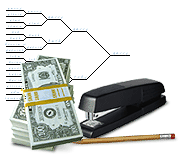Office Pools

The real NCAA action isn't under the backboard—it's above the water cooler
by Mike Morrison |
 The FBI estimates that over $2.5 billion is gambled on the NCAA tournament, with only $80 million bet legally through sports books in Nevada. That leaves over $2.4 billion in funds gambled illegally — some through bookies but a significant portion of it from people like us. Tournament Tips
Related Links |
It's March Madness time! The NCAA Men's Basketball Tournament and the Super Bowl are the two crossover sporting events that interest virtually everyone, not just avid sports fans. The reasons? For the Super Bowl, the main attractions tend to be the ads and the parties, but for the NCAA Tournament, we all know it's the office pool.
Don't even try to deny it. We've all taken part in or at the very least been witness to this traditional, if illegal, part of American culture. The FBI estimates that over $2.5 billion is gambled on the NCAA tournament, with only $80 million bet legally through sports books in Nevada. That leaves over $2.4 billion in funds gambled illegally, some through bookies but a significant portion from people like us — lawyers, accountants, receptionists, engineers, and a host of other employees pining away in cubicles across the country.
Although the authorities acknowledge the unlawfulness of these office pools, they're generally too busy with crimes like murders, rapes and thefts to be overly concerned with you throwing five bucks away. In fact, some police stations even admit to having pools of their own. The general feeling is that as long as stakes are low, they have no problem looking the other way. Most pools' entry fees fall somewhere in the $5 to $20 range, which means that although you're technically breaking the law, you needn't worry about an FBI marksman picking you off as you walk down the hallway with a fiver paper-clipped to your bracket.
Company Time
But be careful. Have fun, but don't take too many liberties. It seems as though each year, the police do try to make an example out of some poor participant who got a little too greedy. In January 2002, a middle-manager with AT&T was arrested for allegedly taking a 10% cut (about $3000) from a football office pool in New Jersey. Even if your clean record with the police isn't necessarily in jeopardy, your job might be. We've all heard stories about six-figure entry fees at some Wall Street brokerage houses—in 1991, three traders from Smith Barney and Paine Webber were terminated (that's fired, not killed) after betting $300,000 on the tournament.
Most companies tend to look the other way as long as the pools don't disrupt their employees' work habits. "We do allow it," said a spokesman from Boeing, "as long as it doesn't interfere with their ability to be productive." Many feel that pools actually foster company camaraderie by providing a common interest and topic of discussion for employees that ordinarily wouldn't interact.
Some companies, however, take a tougher approach. In December 1997, Fidelity fired nine employees and disciplined 16 others for betting and participating in sports pools. After conducting routine e-mail and Internet checks, management discovered the employees were receiving betting tips. "Gambling on company time is a violation of company policy and the employees were fully aware of that," explained company spokesman Ann Crowley.







